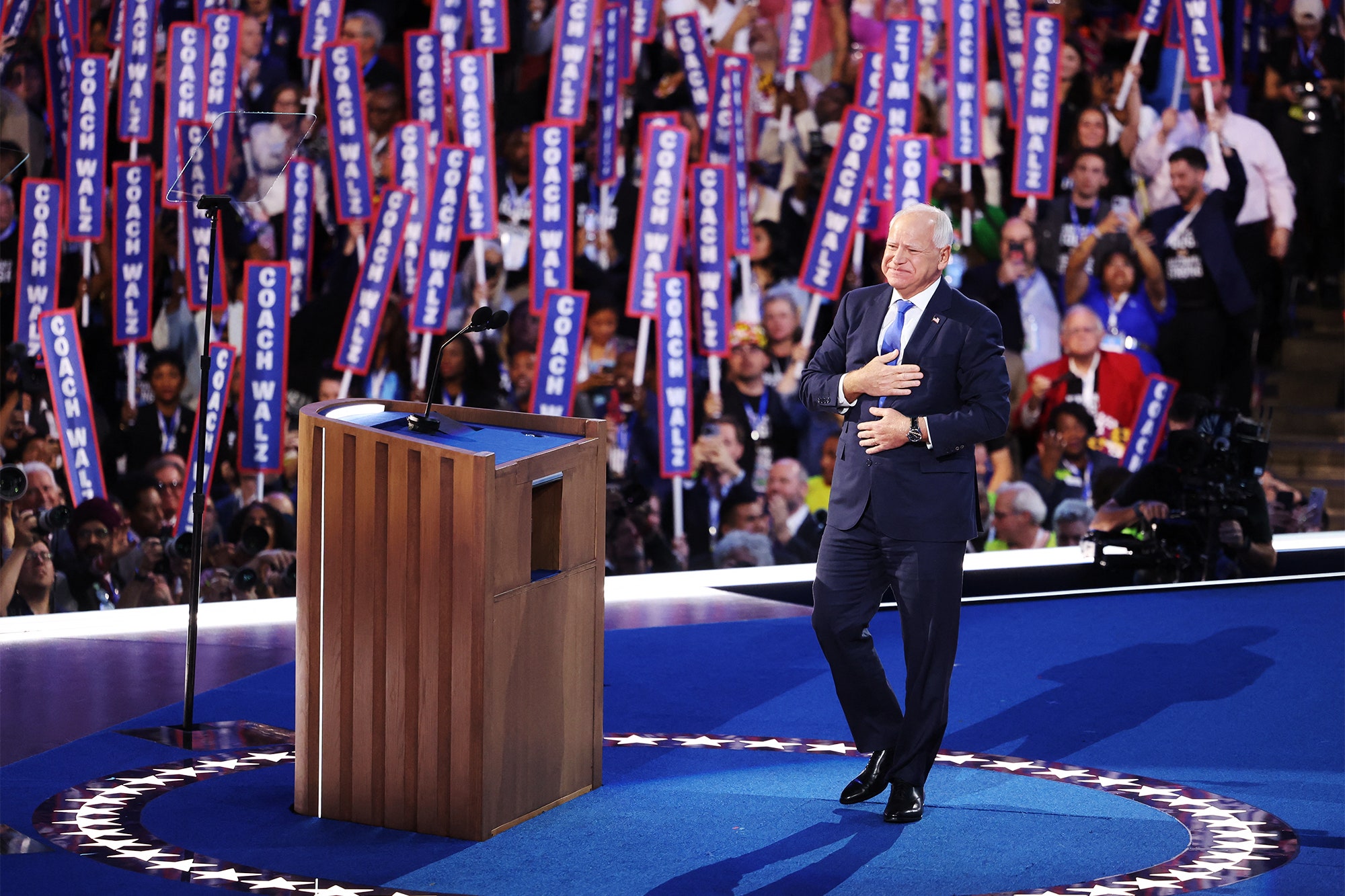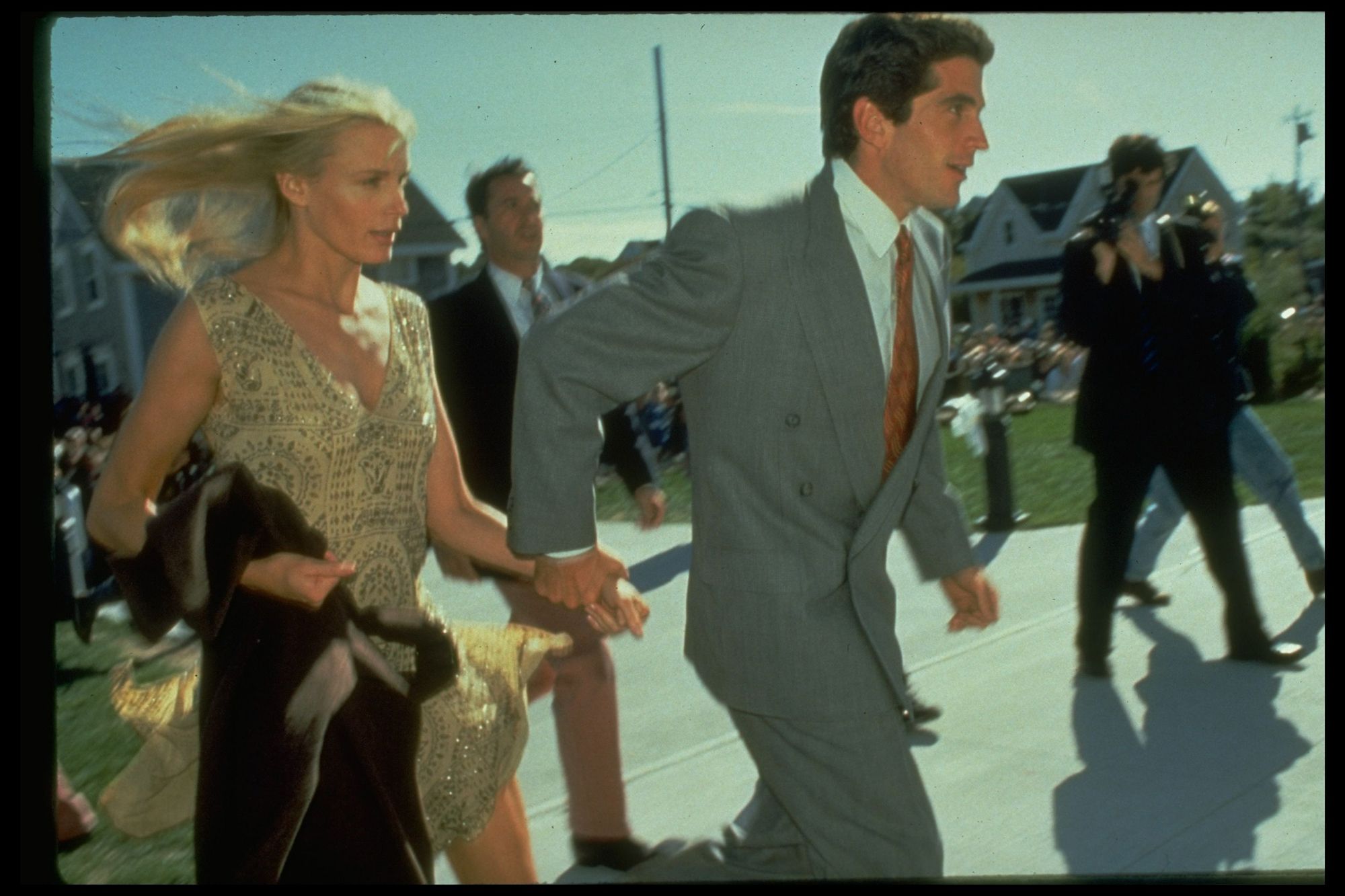Garrison Keillor Discusses Tim Walz and the Lake Wobegon Dilemma | Vanity Fair

The upper Midwest had a moment in the sun at the 2024 Democratic National Convention. Michigan and Wisconsin have a good chance of being the states that decide the election. And with Minnesota governor Tim Walz as Vice President Kamala Harris’s running mate, Democrats have, with some glee, seized on the chance to argue that the party can speak to a kind of down-home Americana that many would say they’ve lost touch with in recent years.
“We are starting the MAMMA movement,” Minnesota senator Amy Klobuchar told the crowd at a breakfast held by the Michigan delegation. “Make America Michigan and Minnesota again!”
She then riffed on the line Garrison Keillor once used every week to close a segment called News From Lake Wobegon—the fictional Minnesota town Keillor described in humorous and novelistic running stories on his radio show A Prairie Home Companion. “All the women are strong,” Klobuchar said, “all the men are good-looking, and all the vice presidents are above average!”
A Prairie Home Companion went off the air in 2016. In 2017, Minnesota Public Radio severed ties with Keillor for “inappropriate behavior” in the workplace, which he said at the time was a “more complicated” story. Minnesota Public Radio CEO Jon McTaggart said after an investigation that Keillor’s public comments were not “fully accurate.” In 2022, when asked whether he’d crossed a line, Keillor told CBS, “Evidently, I did.” For a while, the archives of A Prairie Home Companion were taken offline, though they were made available again after Keillor and MPR reached an agreement.
For people who grew up, as I did, listening to the show, it was a turn of events that was hard to process. A Prairie Home Companion, through musical acts and its variety shows, introduced generations of NPR-listening liberals to ballads and anecdotes arising from a deep well of American folklore. In this deeply divided country, one supposed to be built on constitutional ideals rather than ethnic heritage or deep history, there is no official repository for these songs and stories, and no government agency charged with maintaining our cultural memory. These things get passed on organically, or not at all.
The selection of Walz lit up the DNC and hasd, to a degree that would have seemed unimaginable only a few weeks ago. The pick offered a direct counter to the selection of JD Vance as Donald Trump’s own running mate: Democrats have tried to color Vance’s story of rising from poverty to Yale Law, which he tells in his memoir, Hillbilly Elegy, as less “authentic,” the phrasing often goes, than Walz’s own story of teaching high school and coaching football in a small Midwestern town. The accessory of the moment, worn by officials on the convention floor and by squads of young women at the “Hotties for Harris” party, is a Walz-inspired camo cap. The cap, inspired by the fact that Walz himself likes to hunt, is a careful piece of messaging, playing on the way that Walz famously described Republicans of today as “weird,” and suggesting that suddenly Democrats are the party speaking to the values of regular Americana. It is a messaging theme, but it suggests that the Democrats are beginning to realize they need to face down questions about globalization, the hollowing-out of America’s small towns, and deindustrialization of areas like the upper Midwest that left many people in America’s camo-cap-wearing regions disillusioned with the entire project of liberalism, and contemptuous of the Democratic Party.
So from a stairwell in the United Center, as the roll call nominating Harris and Walz was unfolding, I called Keillor, who now continues to tour and give performances at age 82, to ask about Walz.
This interview has been edited for length and clarity.
Vanity Fair: So I have a private theory that something broke in America when A Prairie Home Companion went off the air. To me, growing up, it was a show that represented a liberalism that was still rooted in a kind of localist tradition, and was in touch with the song and story of small-town Americana. But it still fit into a liberal, inclusive vision.
Garrison Keillor: You know, I go around doing shows still, solo shows, and I go hither and yon and play theaters. And people are very moved when I remember when I was in school and we all sang “My Country, ’Tis of Thee.” Which I don’t think is sung often in schools anymore, but that’s not my problem.
And so this whole crowd of people, they love the notes and they sing. And some audiences sing it better than others, but it’s very moving. They might sing “God Bless America.” We could go on. But it’s all of these people, strangers standing shoulder to shoulder in the dark, and they feel this emotional bond. This is my generation, and we may be the last generation that knows all the words.
That seems to be something the Walz pick speaks to.
The thing that impressed me about Tim Walz when he was running for governor—his people asked if I would hold a fundraiser at my house. I used to live in a big, big house on Summit Avenue in St. Paul. I said, Sure, of course.
And he came and he gave a speech off the cuff, standing outside in a back garden that looked out onto the Mississippi. And it was such a decent speech, such a down-to-earth speech. Nothing about historic injustices, no grand scheme of economics, but really about decency and civility. And he said that a child has a right to a good education—every child. And this is fundamental. But a child cannot get a good education if he or she goes to school hungry. There is in our midst—always has been in our midst—people who are living on the very edge, and their children should be taken care of.
This points to something at work in politics around the world right now. I have a friend who works in the new British Labour government, who told me that they’ve realized suddenly that to win an election, they had to get out there and sing “God Save the King,” and to make it clear they believed in an intangible sense of history, and that sort of thing. And I guess the question liberals around the world have been wrestling with is, sometimes that ends up looking like a project that only includes a certain kind of person. Can you talk about the difficulty of reconciling that here in America?
The thing that brought Governor Walz to attention was his use of the word weird. And this is a word that leaps out when uttered by an elected official. This is a word one would expect to come from a teenager, but it was absolutely appropriate. Millions of people felt the same thing when they heard it. That this truly described an aspect of the opposition, the denial of the 2020 election results. The statement that President Biden was the worst president in the history of the country, that Kamala Harris was the worst vice president in the history of the country. Donald Trump saying that he’s better-looking than Kamala Harris. It’s weird.
And it’s clear that Tim Walz learned something from teaching high school. He picked up some language and it rang the bell of authenticity, which in this day and age of social media has become very precious and very rare. The same when he told the story of during the George Floyd riots in Minneapolis, [and] when President Trump [previously] put out a message [on Twitter], “Liberate Minnesota.” Governor Walz called the White House, and he got hold of President Trump and he said, “What do you want me to do that I’m not doing?” He did not get out and give a speech, because there were armed men demonstrating in front of the governor’s mansion. And the governor’s daughter, his little girl, was terrified. And he asked President Trump to talk to his daughter. And President Trump, to his credit, talked to this little girl. This is the sort of humane view of public service that is so missing with all of the anger on both sides and all of the incredible, almost violent rhetoric. Half the country thinking the other half is crazy. This is a tone of authenticity that I think rings so true. [Editor’s note: The Trump and Walz teams have offered differing accounts of their communications during the 2020 unrest.]
I know JD Vance well enough to suspect that he’d be personally stung to hear you, of all people, call him weird. Because he’d probably say that what they are trying to do is restore an America that has been sort of lost in this globalized economy and these decisions taken at a high level that kind of reshaped our whole thing into a highly financialized, highly technologized system with no rootedness or meaning at its core—all this sort of thing. Their whole project is essentially now saying that it’s liberalism and liberals who are weird, and trying to rebuild an America that it believes in itself. Why has that not actually worked, and why has it translated into something that’s so divisive?
Younger people, people under 40, particularly people who have done as their parents urged them to do and gotten a good education—this country, this culture, is not terrifying to them. It is not a threat to them. They believe in it; they’re moving ahead with it. And so this is a difference between uneducated, less educated old people and ambitious young people who are taking control of this culture and this economy.
I am 82 years old and I’m glad to see this happen. To me this is the most natural thing in the world. I don’t know JD Vance; I didn’t read his book. I know very little about him. He’s the vice presidential candidate, and so his job is to be on the attack. I understand that. I’m talking about the head of the ticket and the increasing unreality that he is trying to sell to people. American isolationism is not a noble idea in a world at such great conflict. The idea that we can pull back and that we can live within our boundaries. The reasons why people from Guatemala and Nicaragua are anxious to come to this country, take a look at what’s happening in their country. And they’re coming for the same reason that people always have, because this country is not a third-world country. It’s one of the greatest countries in history and they believe in it.
We have some basic differences with the other side. And I think that weird is a word that strikes a bell. The other side is not interested in policy. If they are, they have not made this clear.
That hits at the thing that gave me the idea to call. Here at the DNC, I keep seeing young people in the famous Harris-Walz camo ball caps. And those caps seem to me to speak to a conversation a bit beyond words. Since I’m talking to you, let’s call it a longing for a Lake Wobegon that most people of my generation have never known. And now with Walz, there seems to be a hope that maybe actually Democrats can speak to that longing. But the thesis on the right is that they can’t.
I think that they want to. I think that the center left, the liberalism, and the party have been weighted far too far on the academic side, and they find it hard to talk face-to-face. I think that having a Democrat who is a hunter and who coached football and who taught in a public school in a small town is an enormous symbolic step. And that is one of the things that has created such enthusiasm for this ticket. And the fact that the party pulled itself out of a losing position in just a few weeks I think is astonishing. And it was all done back behind the scenes and I don't know how it was done, but eventually, I assume, we’ll find out.
I guess that’s where reporters should be coming in.
The center left, the liberal wing of the party, has tended to be the party of doom and gloom, focusing on historic injustices. Which certainly have a basis in fact, but this woman is the child of people of great ambition who came to this country for a better life, and she shows it every time she appears in public. She is very happy with where she is, and she’s not about to get down in the mud. She’s trying to make this a moment of national unity.




